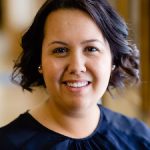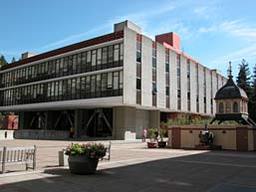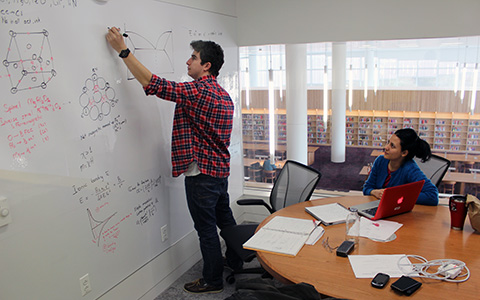 Chemical Information Librarian at the University of California, Berkeley, Kortney Rupp blends two different skill sets. Since June 2017, her job has required her to identify and solve information management challenges and issues involved in university lab-based chemistry research. She also works teaching undergraduate students’ chemical information literacy skills, and is involved in research focusing on information transfer within academic laboratories. She is active in the American Chemical Society (Chemical Information Division) and Digital Library Federation (DLF). We recently caught up with Kortney via email to hear about her career progress, and her views on the changing world of the STEM librarian.
Chemical Information Librarian at the University of California, Berkeley, Kortney Rupp blends two different skill sets. Since June 2017, her job has required her to identify and solve information management challenges and issues involved in university lab-based chemistry research. She also works teaching undergraduate students’ chemical information literacy skills, and is involved in research focusing on information transfer within academic laboratories. She is active in the American Chemical Society (Chemical Information Division) and Digital Library Federation (DLF). We recently caught up with Kortney via email to hear about her career progress, and her views on the changing world of the STEM librarian.
Please tell us about your undergraduate career — you were originally slated to be a chemist, yes?
I started my undergraduate degree in chemistry at an older age than most students around me. My intention was always to go to graduate school and so I immediately began doing undergraduate research and was able to complete 2.5 years of experience when I graduated in 2013. This work included summer research and an internship at Abbott Laboratories within the analytical chemistry division. I learned a ton about how laboratories work at different scales and in different environments. It was during this internship that I unknowingly became interested in data management, while learning GMP recordkeeping requirements — they are extensive!
You liked teaching, too?
I was also a teaching assistant throughout my undergraduate degree, and truly enjoyed teaching others about science. In my graduate program at Purdue, I was able to take on leadership roles within the department as a course supervisor. At one point, I supervised a course of 1,000 students and 26 other teaching assistants. My desire to engage with students is something that has really been foundational for the work I do now. Librarians are educators!
Can you elaborate about your graduate career and how it affected your decision to become a librarian?
During my chemistry graduate work, I was consistently frustrated by the pace of the science. I began to understand that a major hindrance to big discoveries has to do with inconsistencies in undergraduate curriculum on the use of chemical information resources. An even bigger and more alarming hindrance is the impact of poor data management on efficiency and productivity throughout the research lifecycle. Once I understood that librarians — and, more specifically, science librarians — can help solve these knowledge infrastructure issues, I decided I wanted to forego my Ph.D. and complete a second master’s degree in library and information science.

While writing my thesis for my chemistry graduate degree, I had the opportunity to complete a practicum at the Purdue Chemistry Library and then began working as a graduate assistant at Grainger Engineering Library and Information Center at the University of Illinois Urbana-Champaign. In combination with my technical background in chemistry, the experience I gained in those roles prepared me well for taking on my first position as the Chemical Information Librarian and liaison to Lawrence Berkeley National Laboratory.
Because you have been both librarian and scientist, can you identify ways these two professions can work together more closely?
As a graduate student, I really had no idea how much the library supported my work. I only went to the physical space because my advanced quantum mechanics study group met there, exclusively for whiteboard use. In my daily research and coursework, however, I was using the resources paid for by the library all the time! I was very fortunate to have an excellent advisor, who taught us many necessary skills for finding and evaluating peer-reviewed literature and was forward thinking in her approach to research data management (we were one of the few groups who used electronic research notebooks). Unfortunately, these skills are not consistently taught across all graduate programs and my exposure to the potential resources remained quite limited.
Can you address the issue of data management?
Another topic I could have used a lot instruction on was data management. I never heard of the 2013 memo from the Office of Science and Technology Policy, or even data management plans, until I was in library school. Having a librarian come into our group meeting and review file-naming conventions, storage and preservation practices, and processes to prepare data for reuse, would have been extremely valuable. I feel similarly about scholarly communication topics related to publishing and institutional repositories etc.

Note that I said, “Have a librarian come to our group meeting.” This is because research group meetings are the most effective way to engage with scientists. Everyone in the room is doing similar work, and so the instruction can be customized for them to implement the information you are providing in a really meaningful way.
Currently, what do you see as the biggest obstacles to successful collaboration between these various groups?
Well, scientists use a lot of technical language and tend to be extremely research-focused. The reality is that outside of our colleagues (and especially other members of our immediate research family), most people’s eyes glaze over the second we start to explain what we do. Part of this issue stems from the need for simpler explanations and more effective science communication. The other contributing factor is that the science is just often innately very complex and difficult to explain.
Given that much of scientific research is publicly funded, luckily, science communication is becoming an important topic. It’s a valid argument that the public should be able to understand what its tax money is supporting.
Communications appears to be the key — or the lack thereof?
This is where the obstacles truly enter. Many scientists perceive a lot of library instruction as inapplicable to what they do, and too generic. When speaking with my researchers, I always find out who they work for, how far along they are in the academic journey, and, most importantly, what kind of work they do. To be able to really help them, I need to know the type of scientists they are, how they carry out experiments, and their main form of instrumentation.
If you have not been a practicing scientist, you wouldn’t know to ask those in-depth questions. Those are the ones that ultimately allow you to connect with scientists, and show that you truly are invested in the work they do, and in improving their workflows and processes.
Can you discuss the opportunities in the world of not just e-books, but of all the new types of media content?
So, the world of digital media content is exploding. Besides e-books, videos about scientific papers and open protocols (such as the ones JoVE publishes) are bringing science forward in a much more accessible way. I am also very active on Twitter and find that many very well-known scientists are using it as a platform to promote their work. They also have important discussions about what is happening in their fields. All kinds of instruction can be created and deployed using screen-casting videos, animated videos, interactive subject guides, and other visually engaging tools. These provide a robust education and outreach approach to meet a huge range of learner needs. It is an exciting time to be a science librarian and to watch the adoption of these tools become more prevalent.




